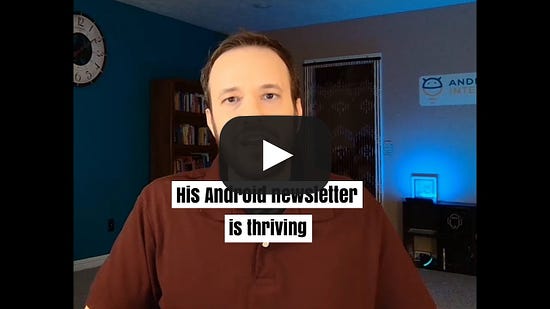Simon Owens's Tech and Media - When paywalls can be counterproductive
When paywalls can be counterproductivePLUS: Will human-produced content benefit from an AI backlash?Welcome! I'm Simon Owens and this is my media industry newsletter. If you've received it, then you either subscribed or someone forwarded it to you. If you fit into the latter camp and want to subscribe, then you can click on this handy little button: Let’s jump into it… When paywalls can be counterproductiveSubstack profiled a writer who managed to grow her newsletter list to 190,000 and convert a whopping 10% of it into paid subscriptions despite never putting up a paywall:
There’s an obvious caveat to be issued here: the writer in question is an epidemiologist who came to prevalence during the pandemic. Because they felt she was providing a public service, her subscribers were willing to pay her without receiving exclusive content in return. I’ve written before about Judd Legum’s success in leveraging his (free) investigative journalism to drive subscriptions, and there are plenty of other success stories that fit this model. I can certainly see the appeal of only working on content that will reach the widest possible audience. But I also think there are limits on how successful this framework can be, especially for media outlets that don’t operate in cause-based niches. There are tens of thousands of creators out there with their hands out asking for money, and most consumers are more than happy to take your free content without paying. Without offering some sort of exclusive benefit, most creators will struggle to drive paid conversions. How JR Raphael built Android Intelligence, a thriving newsletterToday, Android is the number one operating system for smartphones, but when Google launched the product in 2008, the iPhone already had a huge head start. Most consumers didn’t know Android existed, and even the tech press didn’t take it super seriously. But JR Raphael was an early fan. A freelance tech journalist who wrote for publications like Fast Company and The Verge, JR pitched his editors at Computerworld on a regular column about Android, and though they were skeptical at first, they gave him the green light. As Android grew into a major mobile operating system and eventually overtook the iPhone, JR became one of the leading authorities on the product. In 2018, he launched Android Intelligence, a supplementary newsletter that mostly linked to his column and other news items, but as it picked up steam, he began to introduce more and more monetization features. By 2023, Android Intelligence was generating the majority of his annual income. In our interview, JR explained to me why he was such an early fan of Android, what motivated him to launch the newsletter, and how he turned it into a thriving business. Watch our discussion in the video embedded below:  If video embeds don’t work in your inbox, go here. Will human-produced content benefit from an AI backlash?The Verge put together a good rundown of how AI-created content is accelerating the "enshittification" of the web, mostly by flooding the zone with low-quality content that's clogging search results and USG platforms:
Which brings me to this tweet from media entrepreneur Rafat Ali: “Human-created quality editorial is the biggest moat you have in the age of AI-created-synthetic-content-at-scale. Dispute it.” AI experts have already predicted that large language models that train AI will start scraping AI-generated content, which would lead to a quick degradation of quality. As unscrupulous publishers continue to clog the internet with this stuff, consumers will increasingly find themselves getting burned by bad information, and we could eventually see a major shift back toward media outlets that guarantee human-produced content. Is Rafat being too optimistic? Maybe. But as that Verge article makes clear, we’re already seeing real-world examples of our information ecosystem being damaged by AI. YouTube’s AI dubbing could have a huge impact on a channel’s viewershipYouTube is rolling out a new functionality that will take dialogue in a video and translate it into other languages:
This could eventually have a huge impact on a channel's viewership. A lot of the biggest YouTubers have been shelling out money for a years now to hire professional actors to dub their videos in different languages, and Netflix has also seen lots of success with this strategy. Take Mr. Beast as an example:
All of that is simply content that’s repurposed and dubbed from his main channel. Quick hitsI've often wondered if the print versions of newspapers serve as a kind of albatross that prevent the outlets from truly adapting to the web. Sure, they can still be major revenue drivers and are valued by certain portions of the community, but they also mire publishers into a print-centric mentality. [The Guardian] It's become almost a cliché to note that the internet removed most of the barriers to publishing, making it easy for anyone to become a publisher. But it's only within the last few years when sophisticated publishing and monetization tech became widely available for little to no cost. A lot of the basic features on, say, Substack were incredibly difficult to pull off unless you had access to a tech team and enterprise software. [Growth Croissant] A cool profile of an anonymous Wall Street Banker who launched a popular meme account and grew it into a media brand. [Financial Times] This feels gimmicky as hell. I doubt a team of journalists VCs are going to be any better at vetting early-stage startups than normal VCs. [Axios] I find it extremely weird that an investment firm founded on the idea of funding black media entrepreneurs keeps trying to buy legacy publications owned by white people. [WSJ] Want to reach 14,572 operators who work on digital content?Visit my sponsorships page to learn more on how we can work together. You're currently a free subscriber to Simon Owens's Media Newsletter. For the full experience, upgrade your subscription. |
Older messages
The culprit behind Business Insider's falling subscription numbers?
Friday, June 23, 2023
PLUS: How to grow your sponsorship revenue
The valley of churn
Thursday, June 22, 2023
PLUS: Why the new newsletter product from WordPress is so interesting
Let's talk about growing your sponsorship revenue
Tuesday, June 20, 2023
We've lined up top ad sales experts to answer your questions
Paywalls aren’t blocking access to high-quality news
Tuesday, June 20, 2023
PLUS: CNN is in denial
5 case studies of successful media entrepreneurs
Monday, June 12, 2023
Let's go deep on what made their ventures so successful
You Might Also Like
Silencing Voice of America
Wednesday, March 19, 2025
Plus: Soccer in Israel and Palestine, a maybe ceasefire, and Kamala Harris's loss. View this email in your browser March 19, 2025 A man in black walks head bowed down stairs at sunset. Behind him,
Are the people who Trump sent to a Salvadoran prison actually gang members?
Wednesday, March 19, 2025
On March 15, President Trump signed a proclamation invoking the Alien Enemies Act of 1798. ͏ ͏ ͏ ͏ ͏ ͏ ͏ ͏ ͏ ͏ ͏ ͏ ͏ ͏ ͏ ͏ ͏ ͏ ͏ ͏ ͏ ͏ ͏ ͏ ͏ ͏ ͏ ͏ ͏ ͏ ͏ ͏ ͏ ͏ ͏ ͏ ͏ ͏ ͏ ͏ ͏ ͏ ͏ ͏ ͏ ͏ ͏ ͏ ͏ ͏ ͏ ͏ ͏ ͏ ͏
Numlock News: March 19, 2025 • Daredevil, Slugging, Rap Battle
Wednesday, March 19, 2025
By Walt Hickey ͏ ͏ ͏ ͏ ͏ ͏ ͏ ͏ ͏ ͏ ͏ ͏ ͏ ͏ ͏ ͏ ͏ ͏ ͏ ͏ ͏ ͏ ͏ ͏ ͏ ͏ ͏ ͏ ͏ ͏ ͏ ͏ ͏ ͏ ͏ ͏ ͏ ͏ ͏ ͏ ͏ ͏ ͏ ͏ ͏ ͏ ͏ ͏ ͏ ͏ ͏ ͏ ͏ ͏ ͏ ͏ ͏ ͏ ͏ ͏ ͏ ͏ ͏ ͏ ͏ ͏ ͏ ͏ ͏ ͏ ͏ ͏ ͏ ͏ ͏ ͏ ͏ ͏ ͏ ͏ ͏ ͏ ͏ ͏ ͏ ͏ ͏ ͏ ͏ ͏ ͏ ͏ ͏
Deadly Fires in Oklahoma, Astronauts Return, and Rafting Iguanas
Wednesday, March 19, 2025
Oklahoma wildfires killed four, injured at least 200, and destroyed over 400 homes as high winds and storms sparked nearly 150 fires across the state. ͏ ͏ ͏ ͏ ͏ ͏ ͏ ͏ ͏ ͏ ͏ ͏ ͏
☕ Gee Wiz
Wednesday, March 19, 2025
Google makes its biggest acquisition ever... March 19, 2025 View Online | Sign Up | Shop Morning Brew Presented By Miso Robotics Good morning. Home at last! Yesterday evening, NASA astronauts Suni
Misophonia: Beyond Sensory Sensitivity
Wednesday, March 19, 2025
... ͏ ͏ ͏ ͏ ͏ ͏ ͏ ͏ ͏ ͏ ͏ ͏ ͏ ͏ ͏ ͏ ͏ ͏ ͏ ͏ ͏ ͏ ͏ ͏ ͏ ͏ ͏ ͏ ͏ ͏ ͏ ͏ ͏ ͏ ͏ ͏ ͏ ͏ ͏ ͏ ͏ ͏ ͏ ͏ ͏ ͏ ͏ ͏ ͏ ͏ ͏ ͏ ͏ ͏ ͏ ͏ ͏ ͏ ͏ ͏ ͏ ͏ ͏ ͏ ͏ ͏ ͏ ͏ ͏ ͏ ͏ ͏ ͏ ͏ ͏ ͏ ͏ ͏ ͏ ͏ ͏ ͏ ͏ ͏ ͏ ͏ ͏ ͏ ͏ ͏ ͏ ͏ ͏ ͏ ͏ ͏ ͏ ͏ ͏
Microsoft isn't fixing 8-year-old shortcut exploit abused for spying [Wed Mar 19 2025]
Wednesday, March 19, 2025
Hi The Register Subscriber | Log in The Register Daily Headlines 19 March 2025 Microsoft Microsoft isn't fixing 8-year-old shortcut exploit abused for spying 'Only' a local access bug but
FW: Less browsing, more buying
Wednesday, March 19, 2025
Join us on March 20th. Hi there, St. Patrick's Day may be over, but there's still time to strike gold in content strategy! 🌟 Join us this Thursday, March 20th to learn how to craft seamless,
Mya Gelber’s Latest Hunt and a Snoafer Primer
Wednesday, March 19, 2025
Plus some Madewell tees on sale. The Strategist Every product is independently selected by editors. If you buy something through our links, New York may earn an affiliate commission. March 18, 2025 So
Columbia University Must Choose Between Courage and Cowardice
Tuesday, March 18, 2025
March 18, 2025 THE CITY POLITIC Columbia University Must Choose Between Courage and Cowardice By Errol Louis The Alma Mater statue at Columbia University. Photo: Spencer Platt/Getty Images The leaders
